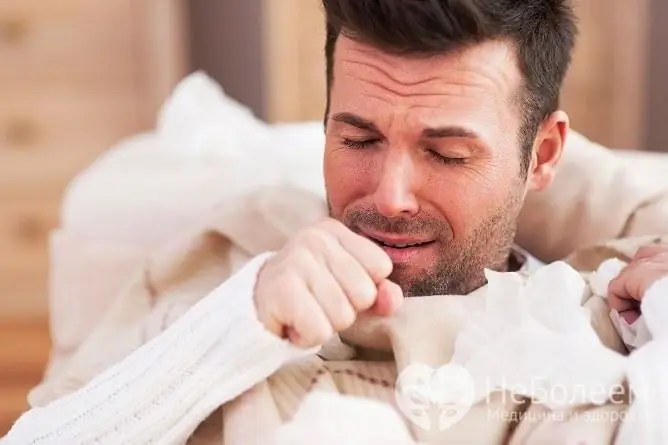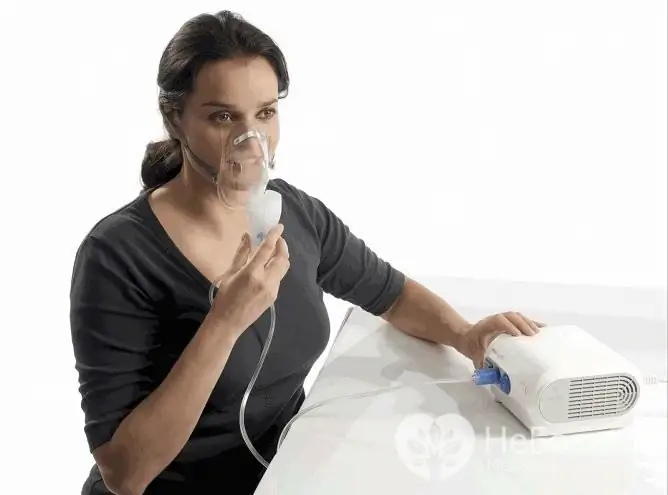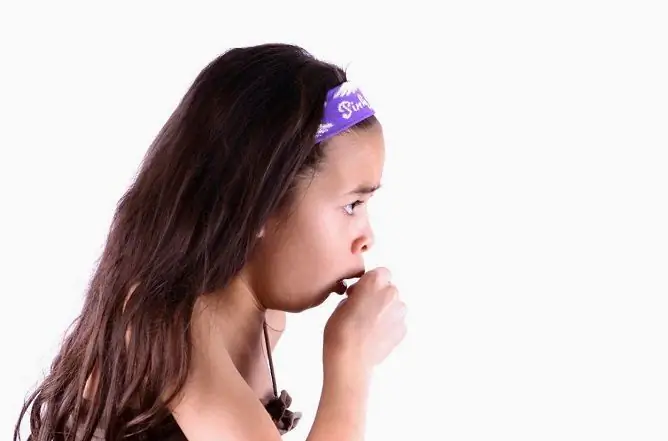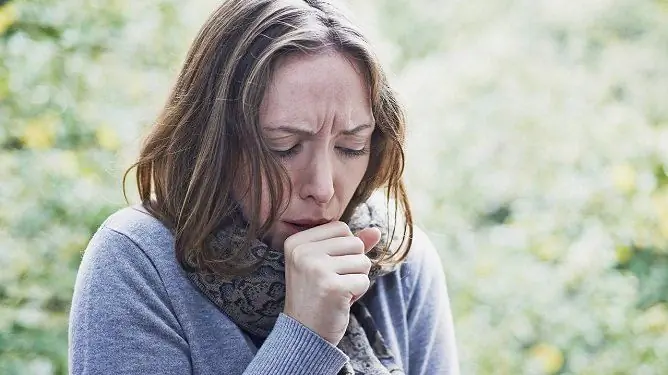- Author Rachel Wainwright wainwright@abchealthonline.com.
- Public 2024-01-15 19:51.
- Last modified 2025-11-02 20:14.
Dry cough in an adult without fever: causes, treatment
The content of the article:
- Types and causes of dry cough in an adult without fever
- Dry cough for various diseases
- Diagnostics
-
How to treat dry cough at normal body temperature in adults
- Allergy
- Infectious diseases
- Foreign body in the airway
- Digestive system diseases
- Taking medicines that cause coughing
- Psychosomatic cough
- Video
Dry cough in an adult without fever can be due to both physiological and pathological reasons.
Normally, an adult has no more than 20 cough tremors per day. A cough that is not associated with infectious inflammation can go away on its own when the factor that caused it is eliminated, without requiring special therapy. In other cases, treatment is necessary, it can be conservative and surgical. Therefore, before starting the treatment of dry cough without fever in adults, you need to establish its cause.

Dry cough in the absence of fever is far from always harmless, if it appears regularly for a long time, it is necessary to find out the cause
Types and causes of dry cough in an adult without fever
A cough is divided into productive and non-productive, depending on whether sputum is secreted (produced) during it. A cough without sputum is called dry.
By the nature of the course, coughing happens:
- acute - lasts no more than 3 weeks;
- protracted - more than 3 weeks;
- chronic - lasts for years.
The table shows the most common causes of cough in adults.
| Type of cough | Pathological conditions |
| Acute |
Infectious process in the upper respiratory tract Ingestion of a foreign body into the respiratory tract Bronchial asthma in the acute stage Adverse environmental impact |
| Protracted |
Cough after an infectious disease Otorhinolaryngological diseases The debut of chronic pulmonary and extrapulmonary pathologies |
| Chronic |
Chronic forms of otorhinolaryngological diseases Bronchial asthma Tuberculosis Neoplasms of the upper and lower respiratory tract Diseases of the cardiovascular system Diseases of the gastrointestinal tract Smoking Taking certain medications |
A cough at normal body temperature most often occurs in the following situations:
- early stage of infectious and inflammatory diseases of the respiratory tract;
- whooping cough;
- endocrine diseases;
- allergy (most often dust, wool and particles of the skin of animals, feathers of birds, pollen of plants, food, medicines, household chemicals and cosmetics are allergens);
- too dry air in the room (especially during the heating season);
- stress (psychosomatic cough).
Dry cough for various diseases
A dry cough in patients against a background of normal body temperature can develop with various diseases, depending on the disease, it will be accompanied by different symptoms.
| Pathology | Symptoms |
| Pharyngitis | Sore throat. As the disease progresses, the cough becomes barking, hoarseness or temporary loss of voice occurs. |
| Laryngitis | Laryngeal edema, choking (especially in young children). |
| Bronchitis | Soreness along the trachea and bronchi, deterioration in general health. |
| Otorhinolaryngological pathologies | The cough is worse at night. In addition to him, there is nasal congestion, nasal discharge, headache, and there may be ear pain. |
| Allergy | Rash on the skin, itching, sneezing, runny nose, difficulty breathing, watery eyes, redness of the eyes. At the end of a coughing attack, scanty vitreous (viscous and transparent) sputum may be released. |
| Bronchial asthma | Paroxysmal cough, accompanied by wheezing, can turn into an attack of suffocation. An attack can be triggered by physical exertion, inhalation of cold air, chemical fumes, and tobacco smoke. |
| Pulmonary tuberculosis | Prolonged cough, weight loss, constant weakness, increased sweating at night. |
| Oncological diseases | An agonizing cough can disturb the patient for a significant part of the day and lead to suffocation. It is accompanied by a decrease in body weight, a deterioration in health, weakness, and fatigue. |
| Whooping cough |
More common in children, but a sick child can infect an unvaccinated adult. Paroxysmal cough intensifies in the evening, During a coughing attack, facial flushing develops, in severe cases - apnea, nausea and vomiting, involuntary urine flow, convulsive seizure. A cough can bother a person for another 3-4 weeks after the disappearance of other clinical signs of the disease. |
| Psychosomatic cough | Most often occurs in young people in stressful situations, with strong excitement, emotional upheaval. There are no other clinical signs. The cough usually goes away on its own after a while. |
| Diseases of the digestive tract (gastroesophageal reflux disease, gastritis with high acidity) | The cough occurs some time after eating. In addition to coughing, the patient is worried about heartburn, belching, an unpleasant taste in the mouth, bloating, nausea and vomiting, and stool disorders. |
| Diseases of the cardiovascular system | Cough occurs after physical or psycho-emotional stress. The cough is accompanied by shortness of breath, chest pain, high heart rate, increased blood pressure. |
| Endocrine pathologies | Cough is caused by an enlargement of the thyroid gland (compression syndrome), accompanied by hyperexcitability, sleep disorders, and sometimes tremors of the upper limbs. |
When an object passes through the larynx, the patient suffers from suffocation, cyanosis of the skin, spots on the skin of the face, and voice disturbances. A large object trapped in the respiratory tract can cause immediate death.
If the foreign body is sharp, there is chest pain, bleeding from the mouth.
If the object passes into the lower respiratory tract, the person has:
- paroxysmal cough (similar to whooping cough);
- voice changes up to aphonia;
- noisy breathing.
A dry cough (usually in the form of a constant coughing throughout the day) can occur with certain drugs, which primarily include drugs to lower blood pressure. Other symptoms are usually absent.

Certain medicines can cause dry coughs
Diagnostics
To identify the cause of a cough that has developed against a background of normal body temperature, a medical examination is carried out, which includes a number of mandatory and additional studies:
- collection of complaints and anamnesis;
- objective examination;
- laboratory tests (general and biochemical blood test, sputum examination, antibioticogram, allergological tests, analysis for tumor markers, etc.);
- X-ray examination;
- bronchoscopy;
- magnetic resonance and / or computed tomography;
- electrocardiography;
- fibrogastroduodenoscopy.
If a dry cough does not resolve for a long time, the patient has an increased risk of infection, which is facilitated by constant irritation of the mucous membrane of the respiratory tract.
How to treat dry cough at normal body temperature in adults
A lack of temperature is often perceived as a sign of a frivolous pathology, but this opinion is erroneous, a dry cough, especially a prolonged one, can be a sign of serious illness.
Treatment consists in eliminating the cause of dry cough, so only a specialist should do this. Any drugs and methods are used only as directed by a doctor. Antitussive (cough suppressing) drugs are prescribed only if there is no accumulation of mucus in the airways. They are not used together with expectorant and mucolytic drugs.
Allergy
When coughing caused by an allergic reaction, antihistamines, vasoconstrictor nasal drops, hormonal agents are prescribed. In the presence of bronchospasm, bronchodilator, antispasmodic agents are used. In this case, the main thing is to stop contact with the allergen.
Infectious diseases
In the presence of an infection, anti-infectious drugs (antibiotics, antiviral, antimycotics) are prescribed, the selection of which is carried out depending on the type of infectious agent.
Inhalation is effective, since in this case the active substance is delivered directly to the affected mucous membrane of the respiratory tract. You can do steam inhalation, as well as inhalation with a nebulizer or spray.

Inhalation is good for dry cough of infectious origin
Used as a medicine:
- drug solutions;
- saline;
- alkaline mineral water (Borjomi type) or baking soda solution;
- decoctions or infusions of medicinal plants with antimicrobial and anti-inflammatory effects;
- essential oils.
In addition to the main treatment in the absence of contraindications, folk remedies can be used: infusions and decoctions of coltsfoot, linden flowers, plantain, chamomile, licorice root, marshmallow. Many types of breast fees are offered by pharmacies, or you can do them yourself.
For whooping cough, vasodilators, bronchodilators, mucolytic, antitussive drugs, sedatives are prescribed. The use of neurometabolic stimulants, antihistamines, hormonal agents may be required.
Foreign body in the airway
If a foreign body enters the respiratory tract, you should immediately seek medical help, hospitalization of the victim may be required. To retrieve the object, they resort to bronchoscopy, in rare cases, a surgical operation may be needed - the method depends on the size of the object, its location and a number of other factors.
Digestive system diseases
When coughing against the background of diseases of the gastrointestinal tract, the patient can be prescribed drugs that improve peristalsis, antisecretory drugs. Patients are shown a sparing diet, surgical treatment may be required.
Taking medicines that cause coughing
With the development of cough against the background of the use of drugs and the impossibility of replacing them, the patient may be recommended a number of measures that can improve his condition:
- plentiful drinking regime;
- rejection of bad habits;
- walks in the open air;
- humidifying the air in the room where the patient is for a long time;
- regular cleaning and ventilation of living quarters.
Psychosomatic cough
Usually no treatment is required. With a frequently recurring psychosomatic cough, the patient may need to consult a psychologist or psychotherapist. In some cases, sedatives are prescribed to such patients.
Video
We offer for viewing a video on the topic of the article.

Anna Aksenova Medical journalist About the author
Education: 2004-2007 "First Kiev Medical College" specialty "Laboratory Diagnostics".
Found a mistake in the text? Select it and press Ctrl + Enter.






